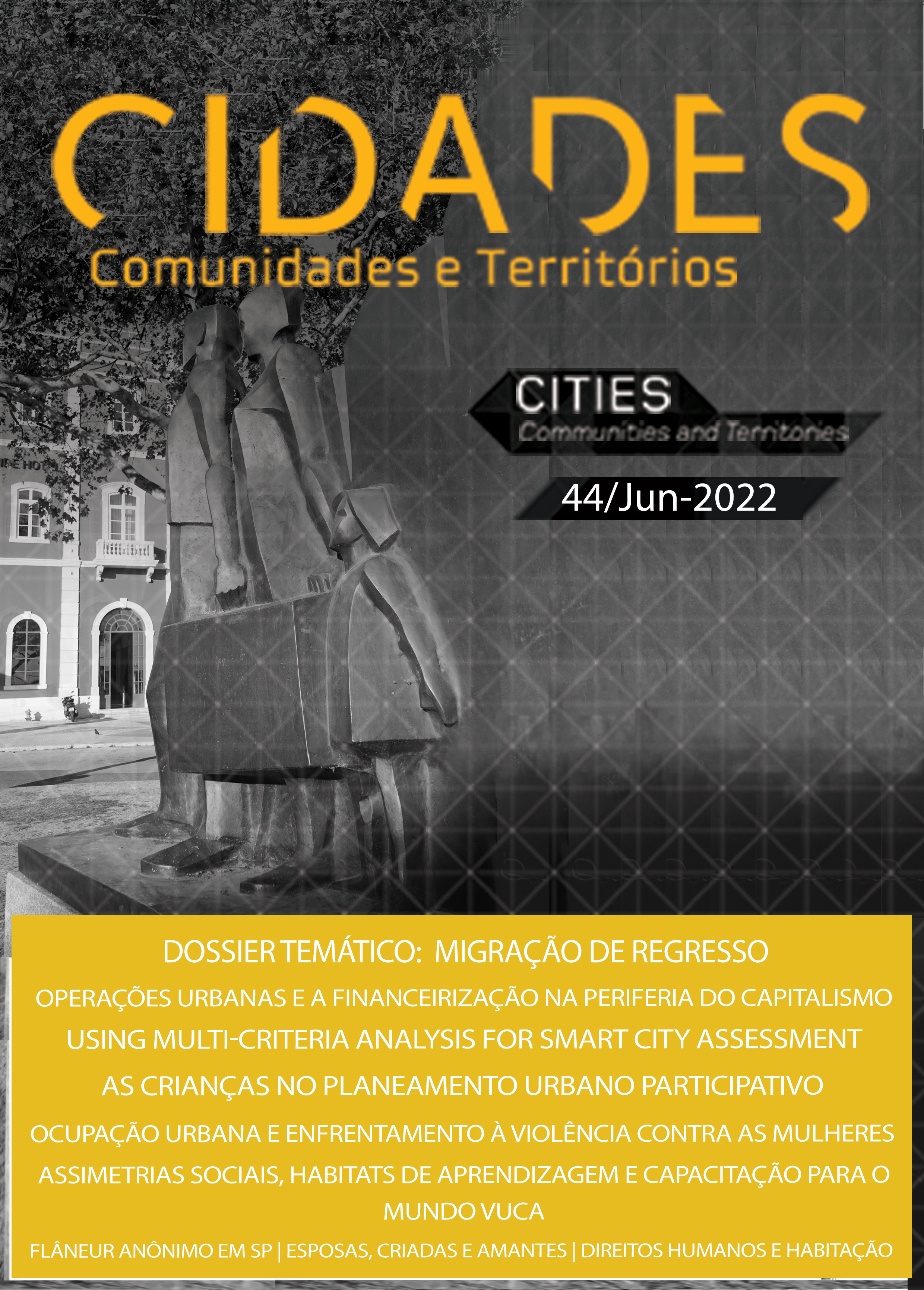Border regions, migration and place-making
The case of Trás-os-Montes in Portugal
Palabras clave:
migration, Portugal, border, place-making, returnResumen
This contribution focuses on the implications of an enquiry on return migration in a border region. The northeastern region of Trás-os-Montes in Portugal is a paradigmatic area of out-migration, from the great migrations to Brazil to the ones to western and northern Europe during the Estado Novo, and the more recent migrations post-2008 crisis. The area went through dramatic demographic losses, accounting for a third of its population between the 1960s and 2000s. But it is also one of the areas with the highest rate of new residents - many of them coming (back) from France. The back and forth of inhabitants is only one form of mobilities in the history of the peninsula: as a border region, Trás-os-Montes is recently revisiting its transcultural heritage, such as the one of the Sephardic Jewish community, the Mirandese minority and more. Enquiring at the border hence holds many meanings, both in time and space, and both for those who stay and those mobile. Based on Pratt (1991) or Cohen & Sheringham (2017)'s understanding of “contact zones”, I explore the dynamics of place production in such a cultural space of encounters, conflicts, and renewal between several communities, in a region which has historically functioned as a transitional space. The theoretical reflection is accompanied by preliminary results of an ethnographic fieldwork conducted between 2018 and 2020 in the region. The case study of a village embedded in various networks, through out-migration and return migration, shows the extent to which the regional efforts to promote the area as “open to the outside” deny the potential of Portuguese emigrants and returnees as active place-makers.
Citas
Amin, A., & Graham, S. (1997). The Ordinary City. Transactions of the Institute of British Geographers, 22(4), 411–429.
Azevedo. L. (2020). Entre lá e cá: migração, objetos e memórias. In E. Lechner, G. Capinha & M. C. Keating (eds) EM migração EM português: Exílios, Retornos, Colonizações. Almedina, 25-45 .
Çaglar, A., & Glick Schiller, N. (2018). Migrants and city-making: Dispossession, displacement, and urban regeneration. Duke University Press.
Carrier, M., & Demazière, C. (2012). Introduction La socio-économie des villes petites et moyennes : questions théoriques et implications pour l’aménagement du territoire. Revue d’Économie Régionale & Urbaine, (2), 135–149.
Cohen, R., & Sheringham, O. (2017). Encountering difference. John Wiley & Sons.
de Sousa, A. (2021). Autarcas portugueses e espanhóis protestam na fronteira de Moimenta da Beira. RTP (22 February 2021). Available at: https://www.rtp.pt/noticias/economia/autarcas-portugueses-e-espanhois-protestam-na-fronteira-de-moimenta-da-beira_a1299290
de Villanova, R. (1994). Maisons de rêve au Portugal.
Dias Lopes, M. M. (2016). Memórias do salto: memórias da emigração ilegal para França, entre 1954 e 1974. Master thesis, University of Porto.
Nunes Mateus, J. (2020). Plano de Recuperação tornará Bragança a cidade portuguesa mais próxima de Madrid. Expresso (29 September 2020). Available at: https://expresso.pt/economia/2020-09-29-Plano-de-Recuperacao-tornara-Braganca-a-cidade-portuguesa-mais-proxima-de-Madrid
Fonseca, M. L. (2008). New waves of immigration to small towns and rural areas in Portugal. Population, Space and Place, 14(6), 525–535. https://doi.org/10.1002/psp.514
García Calderón, V. (2010). La Raya Rota. Photo-exhibition.
Groupe Frontière. (2004). La frontière, un objet spatial en mutation. Revue électronique des sciences humaines et sociales.
Guichard, F. (1979). Origine et réinstallation au Portugal des rapatriés d'Afrique. Finisterra, 14(28).
INE (2012). Census - Final results. Portugal - 2011.
Landau, L. B. (2018). Conclusion: Archipelagos and estuaries: Mobility, local authorities and the governance of multiple elsewheres. In Lacroix and Desille (eds) International migrations and local governance(pp. 215-231). Palgrave Macmillan, Cham.
Leitner, H. (2012). Spaces of Encounters: Immigration, Race, Class, and the Politics of Belonging in Small-Town America. Annals of the Association of American Geographers, 102(4), 828–846. https://doi.org/10.1080/00045608.2011.601204
Massey, D. (1991). A global sense of place.
Massey, D. B., Allen, J., & Pile, S. (1999). City worlds. London; New York: Routledge in association with the Open University.
Mendes Pinto, P. (2020). O turismo judaico como sustentabilidade. Público (29 April 2020). Available at: https://www.publico.pt/2020/04/29/fugas/noticia/turismo-judaico-sustentabilidade-1914076
Nicolau, L. F. Identidades invisibilizadas: Contributo para o conhecimento população cigana local. EDUSER: revista de educação, Vol 4(1).
Pereira, V. (2017). La mémoire de l’émigration portugaise : une mémoire de héros ?. Hommes & Migrations, 2(2-3), 37-43. https://doi.org/10.4000/hommesmigrations.3867
Pinho et al in this special issue. INSERT FULL REFERENCE WHEN AVAILABLE.
Pratt, M. L. (1991). Arts of the contact zone. Profession, 33-40.
Robinson, J. (2006). Ordinary Cities: Between Modernity and Development. London ; New York: Routledge.
Rocha Trindade, M. B. (2013). Festas de migrantes: a transnacionalidade das celebrações. In T. Cid, T. Alves, & I. M. Blayer (Eds.) Portugal pelo Mundo Disperso (pp. 161-176). Tinta da China.
Rogaly, B., & Qureshi, K. (2013). Diversity, urban space and the right to the provincial city. Identities, 20(4), 423-437.
Santos, R (2021). Return Migration and Rural Tourism Development in Portugal, Tourism Planning & Development, DOI: 10.1080/21568316.2021.1953121
Schiller, N. G., & Çağlar, A. (2010). Locating Migration: Rescaling Cities and Migrants. Ithaca, NY: Cornell University Press.
Silva, M. (1984). Retorno, emigração e desenvolvimento regional em Portugal (Vol. 8). Instituto de Estudos para o Desenvolvimento.
Descargas
Publicado
Número
Sección
Licencia
Derechos de autor 2022 Amandine Desille

Esta obra está bajo una licencia internacional Creative Commons Atribución-NoComercial-SinDerivadas 4.0.
CIDADES, Comunidades e Territórios by DINÂMIA'CET-Iscte is licensed under a CC-BY licence.






